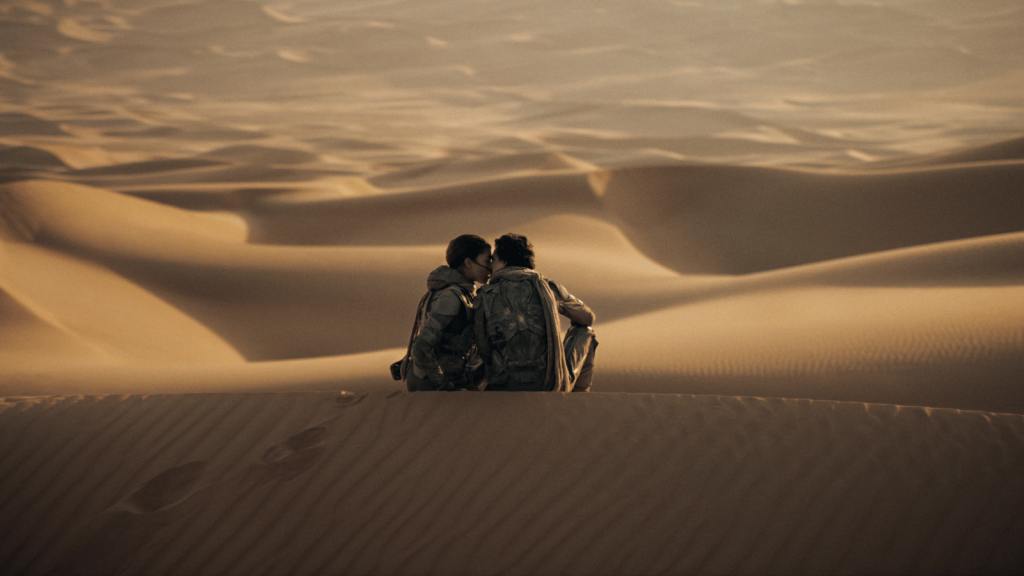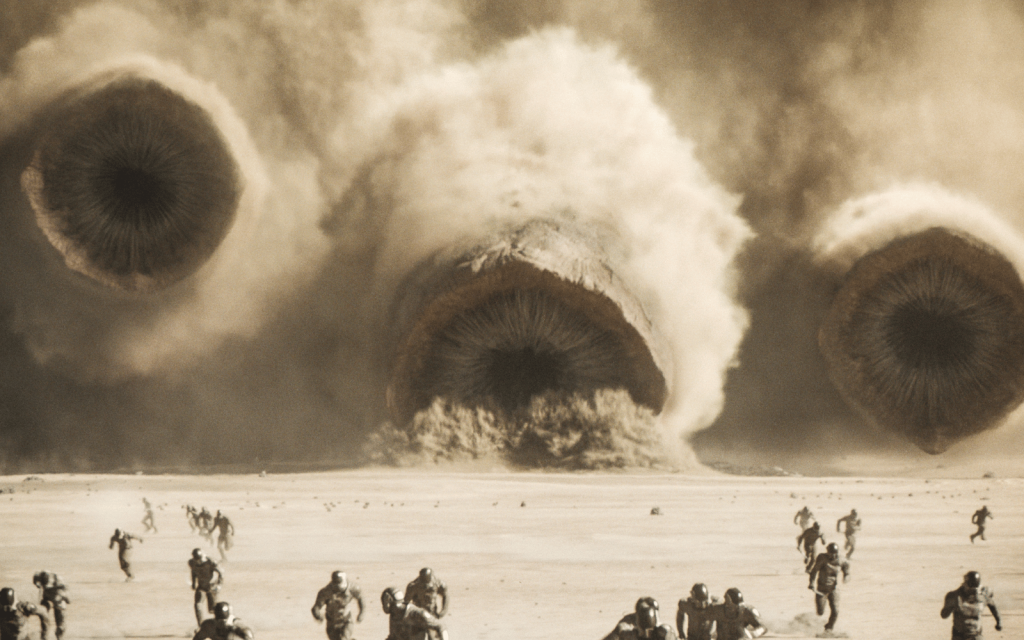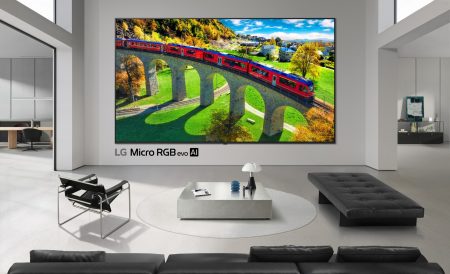It’s not often you find a sequel that can stand up to or eclipse what came before it. Yet that’s exactly what director Denis Villeneuve delivered with Dune: Part Two, the highly-anticipated sequel to his 2021 adaptation of the first half of Frank Herbert’s 1965 novel.
Whether you’re a fan of the books, encountered the Dune Chronicles for the first time with Villeneuve’s previous film, or a complete newcomer, we highly recommend you see the first film (if you somehow haven’t yet) and this one immediately after.
Dune: Part Two is to Dune: Part One, what The Godfather II and The Dark Knight were to their prequels. It’s that good.
Beginnings are such delicate times
 Without spoiling anything, Dune: Part Two picks up where Part One finished. It follows a young Paul Atreides as he joins the Fremen on a journey of self-realisation through the desert planet of Arrakis while seeking revenge for the massacre of his family by the evil and bald Harkonnens who had help from Emperor Shaddam IV. That’s as simplified and stripped back as it gets for a film synopsis but there is far more substance to the main plot and subplots that’s worth discovering for yourself.
Without spoiling anything, Dune: Part Two picks up where Part One finished. It follows a young Paul Atreides as he joins the Fremen on a journey of self-realisation through the desert planet of Arrakis while seeking revenge for the massacre of his family by the evil and bald Harkonnens who had help from Emperor Shaddam IV. That’s as simplified and stripped back as it gets for a film synopsis but there is far more substance to the main plot and subplots that’s worth discovering for yourself.
If you thought Part One had grand ambitions or set the bar high, you’ll be as surprised as we were by how easily Part Two clears that bar. Everything that Part One was praised for (which was most of it), was just as great, if not better in Part Two. That can make Part One seem a little tiny in comparison, almost as if it was nothing more than a two-and-a-half-hour setup for Part Two.
With Part One being the movie it was, we’d strongly argue against that. The best way around this would be for Legendary Entertainment and Warner Bros. to release a full-length five and five-and-a-half-hour director’s cut of both parts edited together. We wouldn’t even be mad if they adapted even more of the first book. If anyone could make that work, it’s Villeneuve.
A time of quiet between storms
 We’ve been fans of Villeneuve since his return to cinema in 2009 with Polytechnique. Our respect and enjoyment of his work have only increased with his subsequent films – Prisoners, Sicario, Blade Runner 2049 – and with Dune: Part Two he is at the top of his game. He was given the freedom (and budget) to develop his ethereal style in this film and makes full use of that freedom in directing and executing his creative vision which brilliantly expanded, and now completes, his adaptation of Frank Herbert’s first book.
We’ve been fans of Villeneuve since his return to cinema in 2009 with Polytechnique. Our respect and enjoyment of his work have only increased with his subsequent films – Prisoners, Sicario, Blade Runner 2049 – and with Dune: Part Two he is at the top of his game. He was given the freedom (and budget) to develop his ethereal style in this film and makes full use of that freedom in directing and executing his creative vision which brilliantly expanded, and now completes, his adaptation of Frank Herbert’s first book.
An easy example to point at is the choices he made in which parts of the book to include and which parts either didn’t make the final edit or were omitted entirely. With a runtime of 155 minutes, this certainly isn’t a short film, yet every scene is expertly crafted and expands on the world-building, often in surprisingly thoughtful ways. This goes a long way in making the world of Dune feel easy to believe in and when you’re saying that about a movie with giant God-like sandworms, that’s a sign of a job well done.
It isn’t only Villeneuve’s direction that makes Dune: Part Two worth seeing. Every cinematic aspect of the project elevates the film to something more than just the sum of its parts. In particular, the production design stood out to us because its attention to detail helped craft a more believable fantasy world. When you’re shown a new thing, especially in a fantasy setting, and the design or use of that thing immediately makes sense within the given context, you have the design team to thank.
Each man is a little war
You can have the best director and production team in the world and your film will still fall flat with a weak cast. That wasn’t an issue with the first movie and it is even less of an issue in Part Two. Every actor made their understanding of the material clear in their performance but three are worth a special mention.
After watching Timothée Chalamet grow into his role as a naive Paul Atriedes in Part One, the maturity and dark complexity he brings to the character in Part Two was impressive. Zendaya’s performance as Chani, Paul’s Fremen chaperone and later love interest, is equally impressive. Her character gets substantially more screen time in Part Two, allowing us to revel in her screen presence and properly enjoy the layered nuances of her performance.
 Austin Butler joins the Dune cast as the sadistic Feyd-Rautha, a member of House Harkonnen and the Baron’s chosen heir. His inclusion provides a convenient avenue for further exploration of the Harkonnen House and its homeworld Geidi Prime. In a film of strange things, it somehow manages to be the strangest. Butler might still be relatively unknown but expect that to change if the physical and vocal performance displayed here are a sign of what’s to come. The explosive energy he brings to the screen can at times feel overdone, but it doesn’t detract from Butler’s performance. He makes it his own – another sign of a successful actor-director relationship.
Austin Butler joins the Dune cast as the sadistic Feyd-Rautha, a member of House Harkonnen and the Baron’s chosen heir. His inclusion provides a convenient avenue for further exploration of the Harkonnen House and its homeworld Geidi Prime. In a film of strange things, it somehow manages to be the strangest. Butler might still be relatively unknown but expect that to change if the physical and vocal performance displayed here are a sign of what’s to come. The explosive energy he brings to the screen can at times feel overdone, but it doesn’t detract from Butler’s performance. He makes it his own – another sign of a successful actor-director relationship.
Working with Villeneuve, Hans Zimmer and Greig Fraser have both produced some of their best work in the music and photography departments respectively. Zimmer’s sweeping score is as grandiose as Fraser’s breathtaking visuals. Listening to the soundtrack for Part One and Part Two sequentially makes Zimmer’s choices clear as wormsign. The entire film feels larger than life but Part Two’s score mirrors the film’s characters and somehow feels more human.
The same can be said of Fraser’s work as director of photography. Where his composition in Part One introduces Arrakis to the audience as a harsh and barren alien planet, in Part Two it feels familiar and almost inviting. Thanks to the slightly longer runtime, we’re treated to even more glamour shots, and when they look this good it’s hard to complain.
Dune: Part Two verdict
Dune has long had a reputation as being ‘unfilmable’, mostly due to the sheer volume of content but also in part due to its many interpretations. That didn’t stop Alejandro Jodorowsky and then David Lynch from trying. Jodorowsky’s film never made it to completion and although Lynch’s 1984 film did, many fans of the books (including Lynch himself) don’t count that as a success.
We’re quite sure hardcore book fans will find something to complain about with Villeneuve’s adaptations and they’ll probably have a point. We’re not saying Dune: Part Two is the be-all and end-all of Dune adaptations but it’s the best one we have right now. Go and watch it on the biggest screen you can.
Dune: Part Two is now showing in theatres.
-
9



